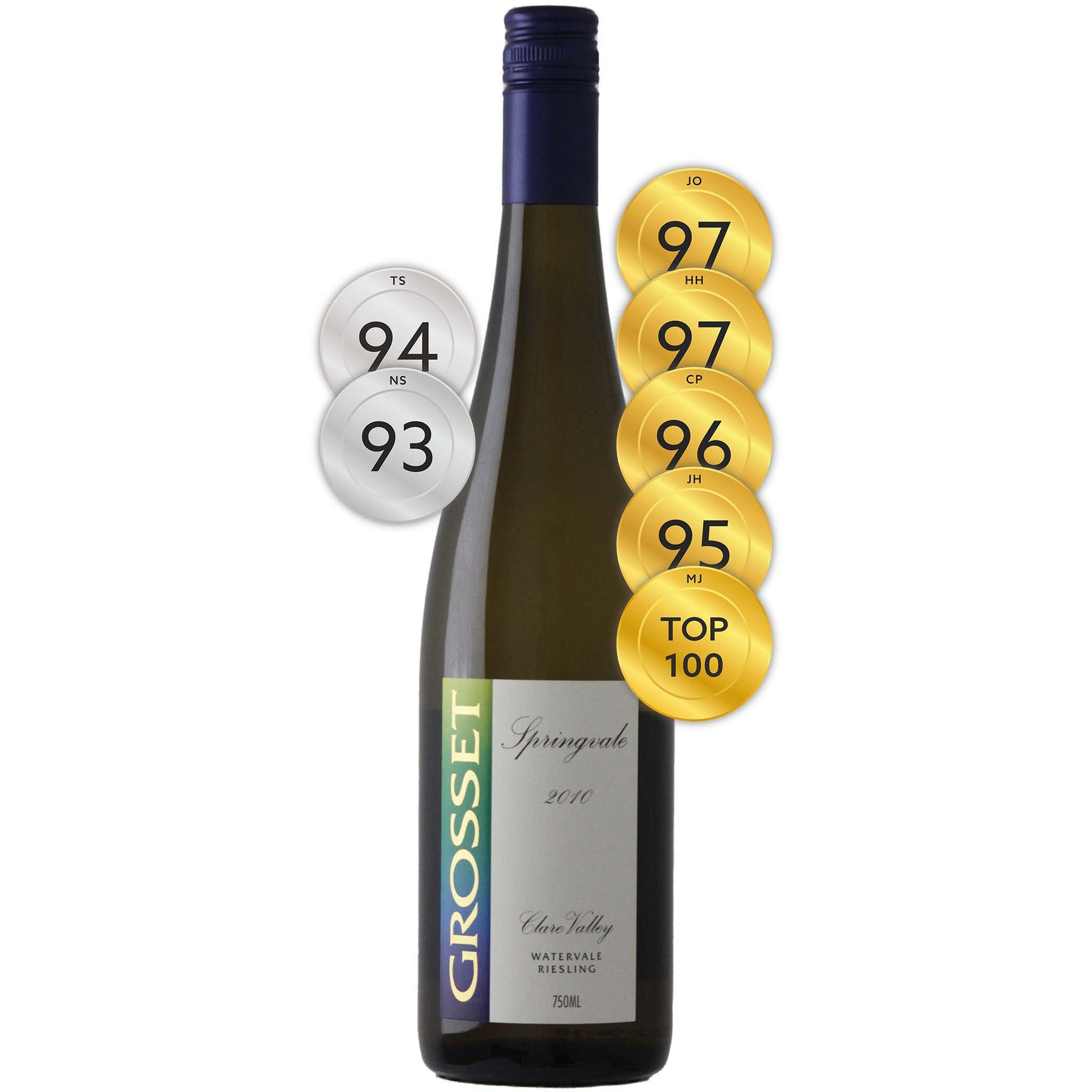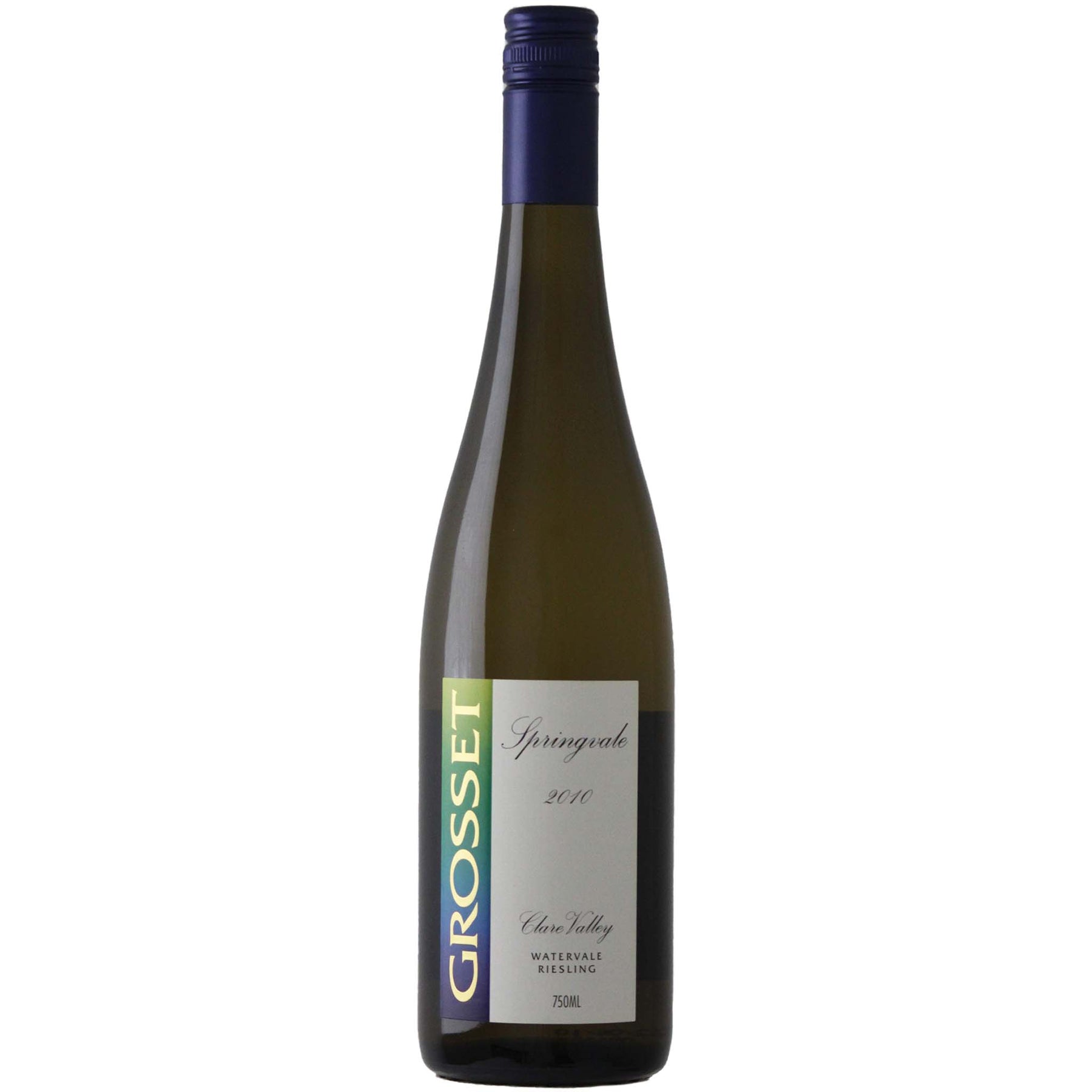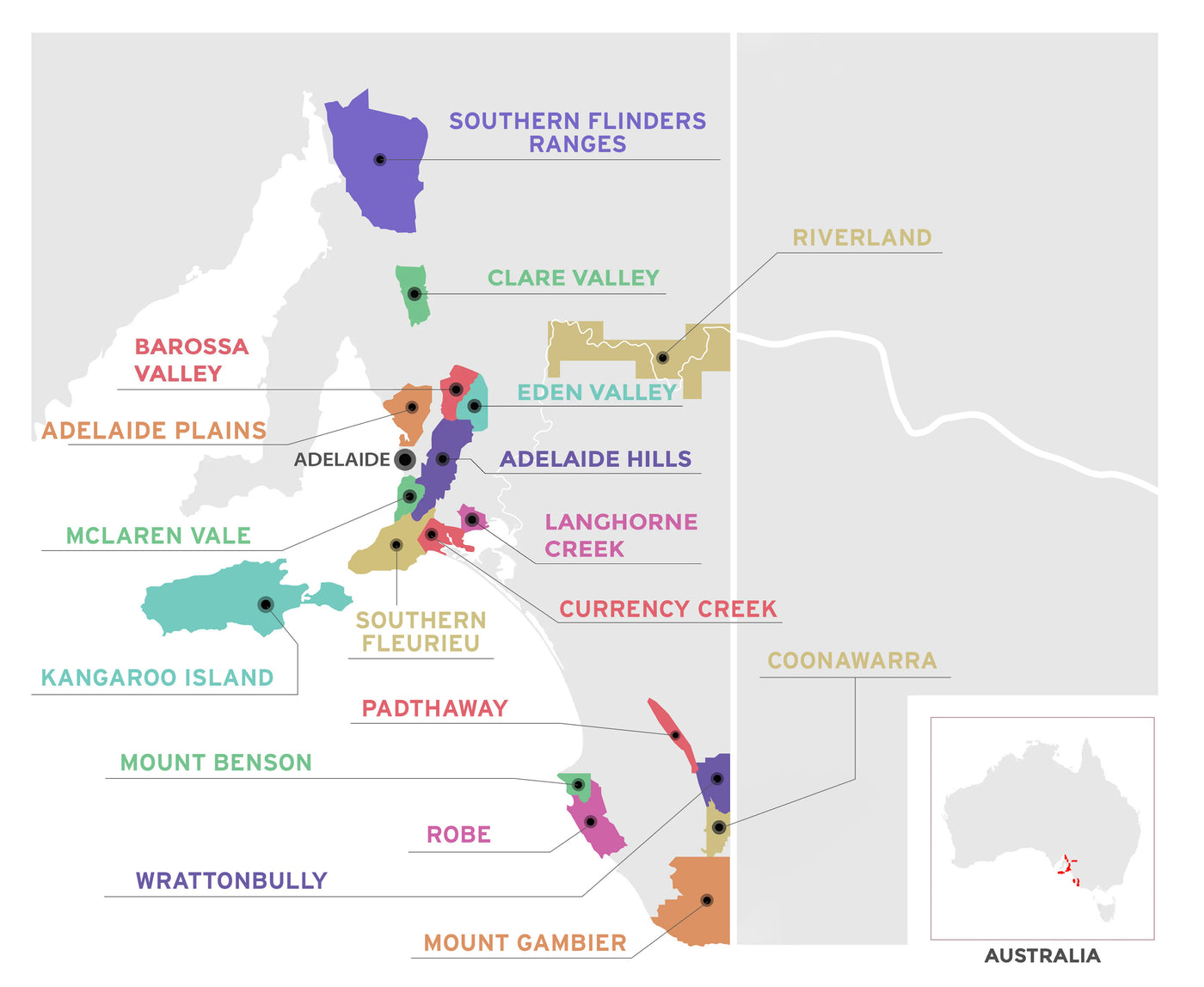

Grosset Springvale Watervale Riesling 2010
Style: White Wine
Variety: Riesling
Closure: Screwcap
Grosset Springvale Watervale Riesling 2010
Warehouse
34 Redland Drive
Vermont VIC 3133
Australia
Critic Score: 97
Alcohol: 13.0%
Size: 750 ml
Drink by: 2025
Matthew Jukes Top 100 Australian Wines of 2011
The Grosset Springvale Riesling may sit somewhat in the shadow of its Polish Hill sibling but it is in its own right one of the benchmark rieslings of the Clare Valley. It is renowned for its aromatic complexity, pure fruit flavours and mouth-watering slatey acidity. The wine is fresh and mineral, typified by lemon curd, lime and chamomile aromas and generous flavours. A classic acid cut runs through the core, providing superb line and mineral length. The first vintage of the Grosset Springvale Riesling was produced in 1981.
"Particularly stylish, with remarkable length and focus. Deeply layered and structured, its crystal-bright bouquet is scented with pear-drop and apple, lavender and white flowers backed by undertones of spice. Long and dusty, with a juicy presence of bright pear, apple and citrusy fruit, it's tightly supported by a fine dusty chalkiness, culminating in a profoundly persistent and truly dry finish punctuated by brittle acidity." Jeremy Oliver
"The 2010 harvest marks the 30th consecutive vintage of the Grosset Watervale Riesling. This single site wine is from the estate's six hectare 'Springvale' vineyard which is mainly on a gentle north-facing slope with red loamy soil over limestone at one of the highest parts of the Watervale subregion. The 2009 'Springvale' was outstanding and Grosset believes that this may be better.
The 2010 Grosset Springvale Riesling has lemon, lime blossom aromatics, intense pure tangy lime juice, is fine and impeccably focused, powerful and tight with mouth-watering zesty quartz minerality on a bone-dry finish that lingers. Layer after layer of flavour washes over the palate followed by an impeccably balanced, satisfying, taut grip. General Cellaring Guide: Enjoy now or cellar 5-12 years." Grosset
Expert reviews
"Full-ish bright yellow; toasty bouquet now with some buttered toast aspects, gorgeous maturity is showing, the wine still taut and refined, discreet and subtle, but layered with the patina of bottle-age. It retains great delicacy on the tongue. Great wine." Huon Hooke, The Real Review - 97 points (Tasted Aug 2022)
"Particularly stylish, with remarkable length and focus. Deeply layered and structured, its crystal-bright bouquet is scented with pear-drop and apple, lavender and white flowers backed by undertones of spice. Long and dusty, with a juicy presence of bright pear, apple and citrusy fruit, it's tightly supported by a fine dusty chalkiness, culminating in a profoundly persistent and truly dry finish punctuated by brittle acidity. Drink: 2022-2030." Jeremy Oliver – 97 points
"In 2010, Springvale is perfectly suited to the vintage conditions with a little less complexity than in 2009 but a far more genial and welcoming outlook. This means that, for once, you can crack on with a Grosset Riesling without feeling that you have committed a vinous sin and without me encouraging you too much. 2010 Polish Hill is also a stunner and I wouldn't blame you if you unscrewed a bottle of this wine too. Jeff's wines always act as a true barometer of the vintage and it is great to see that he has not built these 2010s up too much allowing them to flow effortlessly across the palate. They are a magical pair.” Matthew Jukes, 100 Best Australian Wines of 2011
"It pushes on relentlessly through the mouth, with a bracing surge of mineral-bitten lemon and white pear flavours bonded by the welcomed physicality of a tightening, lengthening extract of somewhat sour-edged, zippy, almost fizzy acids that leave the mouth feeling dry, impressed and dying for more. It's seemingly fuller and richer than some Springvales, but its balancing structure and length pay homage to the pedigree. Once again it seems Mr Grosset can do no wrong with dry riesling. If Australia was riesling, I'd want Jeffrey to be Prime Minister. Drink to 2022." Chris Plummer, Australian Wine Journal – 96 points
"Bright straw-green; a generous bouquet and palate, with ripe citrus and tropical aromas and flavours; impeccable line, length and balance. Offers much now, yet more in the future. Drink Now – 2025.” James Halliday, Halliday Wine Companion - 95 points
"2010 was a warm to very warm vintage that looked to be an early season right from the start. Springvale was picked at the perfect moment to capture a pristine bouquet of lifted lemon and lime blossom and Pink Lady Apples. The palate has great poise, precision and persistence, albeit with a little more expression and richness at this age than the 2009. This will not be the longest-lived Watervale but it shows all the discipline that we have come to love from Grosset." Tyson Stelzer – 94 points
"Early in its life, this is showing lime and grapefruit citrus, smells pithy and intense, and has some stony, savoury elements and fine sherbet-like notes too. The palate's dry and uncompromising, with lemon, lime and grapefruit citrus, some musky flavour, and fine, chalky texture – little green apple to close. Trainspotters will love the subtly styled proprietary bottle." Nick Stock, Sydney Morning Herald Good Wine Guide - 93 points
"From the six hectare Springvale Vineyard at one of its highest (and coolest) points in the north-eastern part of the Watervale district, which is planted on soft rock soils – red loam over limestone. This leads on nose and palate with a seamless and prolonged delivery of mouthwatering lime and grapefruit, perfumed lime blossom and chalk dust, which adds a textural spine. As you'd expect from Grosset it's possessed of crystalline purity and precision, making for a long, controlled, seemingly endless finish with breathtaking fluidity. Broachable if intensely primary and youthful at this stage, with plenty in reserve." Sarah Ahmed, The Wine Detective
"Riesling's unique finesse and delicacy show in these two lovely but very different Clare Valley whites…Grosset's classic appeared in a masked tasting held by Jeir Creek's Kay Howell. This is perfection: classic Watervale (a Clare sub-region) floral and lime aroma; amazingly fine, gentle, juicy, limey palate and clean, fresh, lingering acidity." Chris Shanahan
Awards
Top 100 Australian Wines of 2011 - Matthew Jukes
Springvale vineyard
The Grosset Springvale Vineyard is a six‑hectare, organically certified vineyard situated off Springvale Road in the Clare Valley. It is a hilltop site at one of Watervale's highest elevations (460 metres above sea level), with high exposure to sunlight. The vineyard is part of a much larger property at Watervale, however, the balance of the property is being progressively returned to native vegetation as greater species diversity facilitates natural pest and disease management.
The vineyard is relatively close-planted at 2,500 vines per hectare and produces an average of just two-and-a-half bottles of wine per vine. The vineyard comprises three clones of Riesling, Clone GM110 (tight bunches, floral, Germanic and spiced), Clone 156 (rare clone from Jesuit inspiration, loose bunch, mellow, spiced, limes, steely) and Clone GM198 (most commonly used in Australia; spiced, luscious, generous). The sturdy and resilient vines produce compact yellow-green bunches of moderate sized berries.
The Springvale Vineyard is a unique viticultural site due to its geology, relative isolation and high altitude. The thin topsoils are red loams interspersed with shale over limestone and, atypical for this sub-region, the vines are deeply rooted into slate bedrock. This formation dates back many hundred million years. There is a north-south fault line on the eastern border that limits the vineyard's expansion.
The cool-fermented Grosset Springvale Riesling is renowned for its aromatic complexity, pure fruit flavours and mouth-watering slatey acidity. The wine is fresh and mineral, typified by lemon curd, lime and chamomile aromas and generous flavours. A classic acid cut runs through the core, providing superb line and mineral length.

The four Grosset estate-owned vineyards
About Jeffrey Grosset

"Jeffrey Grosset wears the unchallenged mantle of Australia's foremost riesling maker. Grosset's pre-eminence is recognised both domestically and internationally." James Halliday
Grosset was 15 when his father, an electrician, came home with a bottle of wine and shared it with the family. It was riesling and Jeffrey was gobsmacked. So began the Grosset story. The following year Jeffrey enrolled at Roseworthy Agricultural College, completing an Agriculture degree in 1973 and an Oenology degree in 1975. At the age of 21 Jeffrey started work at Seppelt Great Western, before heading to a German winery with a 1000-tonne crush as assistant winemaker, only to find the chosen French winemaker had changed his mind, leaving Grosset in charge. He subsequently returned to Australia and worked at Lindeman's Karadoc winery with its 30,000-tonne crush. But ultimately he wanted to start his own label.
In 1981 Jeffrey purchased an old milk depot in the historic township of Auburn 1981 and established Grosset Wines. He produced four wines that vintage under his own label, 800 dozen bottles in total. Now, 42 years later, Grosset is regarded as arguably the best maker of riesling in Australia and produces nine wines and 11,000 bottles per vintage.
Grosset is not shy about challenging tradition and questioning accepted practices. In the late 1980s, he was the leader of a successful movement to only allow the use of the word Riesling on Australian wines that were made specifically from the Riesling grape. Until that point, a significant number of Australian wines with Riesling on their label were made from other grape varieties.
Grosset was also the driving force behind a decision in 2000 by Clare Valley Riesling producers to switch to screwcap closures for their wines and to encourage Australian and New Zealand winemakers to do the same, and for the public, retailers and media to embrace the change. He continues to privately fund research into the subject.
Next, he established the Grosset Gaia Fund, donating to charities supporting youth, the arts and the environment. Recently he has led the way for Australian winemakers to use blockchain technology for verification of product provenance, authenticity and seal integrity.
Jeffrey Grosset has received a great deal of local and international recognition for his winemaking. In 1998, he was the first recipient of "Australian Winemaker of the Year" from Gourmet Traveller Wine magazine and was named the "International Riesling Winemaker of the Year" at the Riesling Summit in Hamburg, Germany. He was nominated in 2005 as one of the world's "50 Most Influential Winemakers" by Wine & Spirits and in 2006, named as one of the "Top 10 White Winemakers" in the world by Decanter magazine.
Grosset's philosophy has remained steadfast over the years, the emphasis is on purity of fruit. The estate vineyards, which are ACO certified organic, are hand-tended and each bunch of grapes is harvested at optimum ripeness. The winemaking process is gentle and uncomplicated. With dedication, discipline and the application of knowledge garnered through decades of experience, the result is the finest expression of variety and place.

South Australia
South Australian is responsible for more than half the production of all Australian wine. It is home to more than 900 wineries across 18 wine regions. The regions are Adelaide Hills, Adelaide Plains, Barossa Valley, Clare Valley, Coonawarra, Currency Creek, Eden Valley, Kangaroo Island, Langhorne Creek, McLaren Vale, Mount Benson, Mount Gambier, Padthaway, Riverland, Robe, Southern Fleurieu, Southern Flinders Ranges and Wrattonbully.
Many of the well-known names in the South Australian wine industry established their first vineyards in the late 1830s and early 1840s. The first vines in McLaren Vale were planted at Reynella in 1839 and Penfold's established Magill Estate on the outskirts of Adelaide in 1844.
South Australia has a vast diversity in geography and climate which allows the State to be able to produce a range of grape varieties - from cool climate Riesling in the Clare and Eden Vallies to the big, full bodied Shiraz wines of the Barossa Valley and McLaren Vale. Two of Australia's best-known wines, Penfolds Grange and Henschke Hill of Grace, are produced here. There is much to discover in South Australia for the wine lover.


